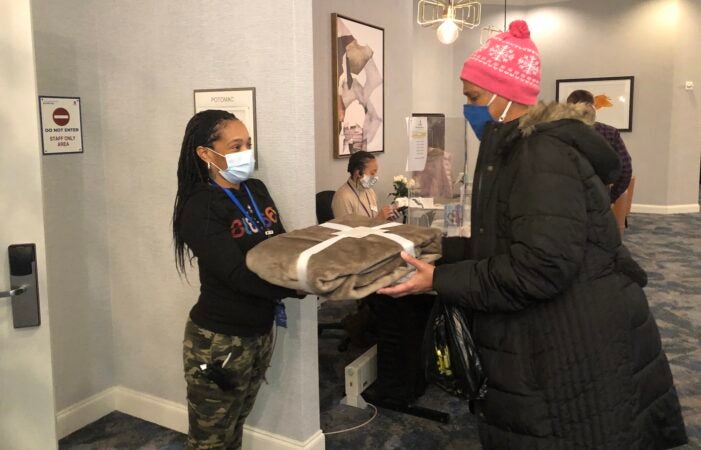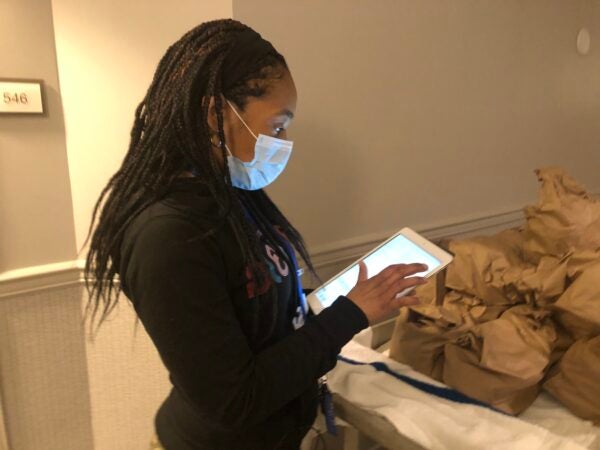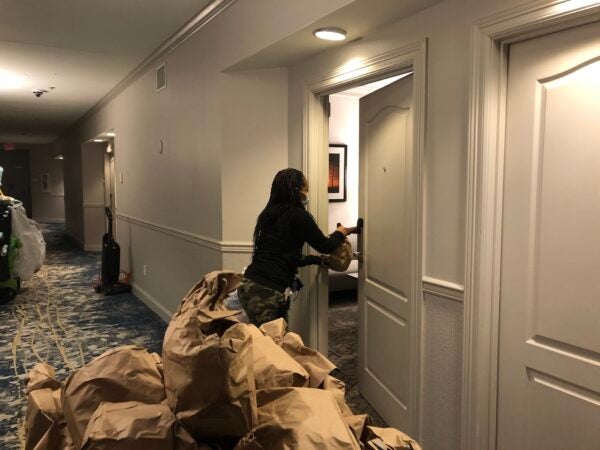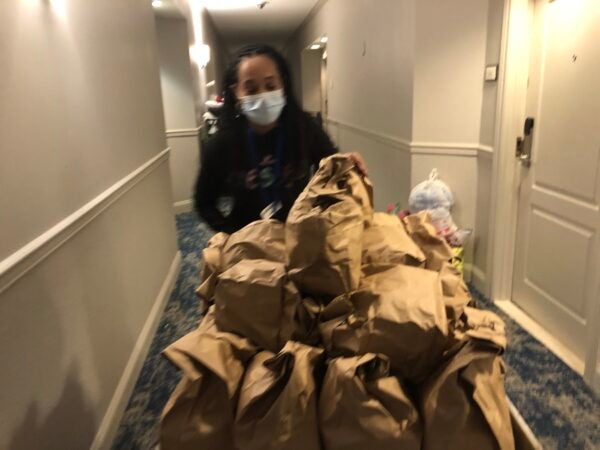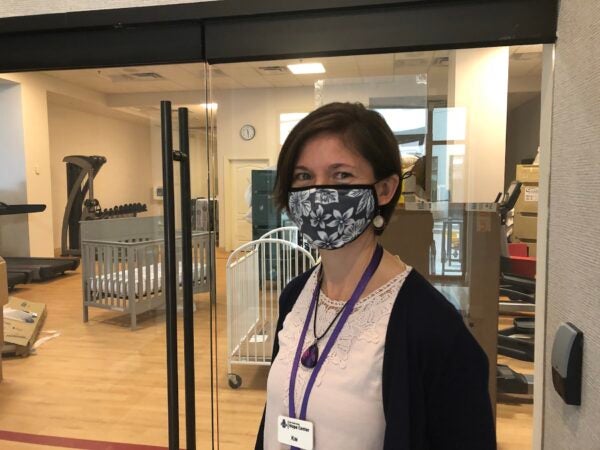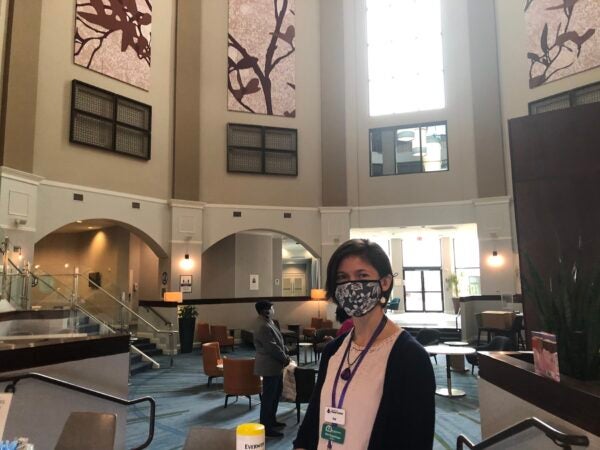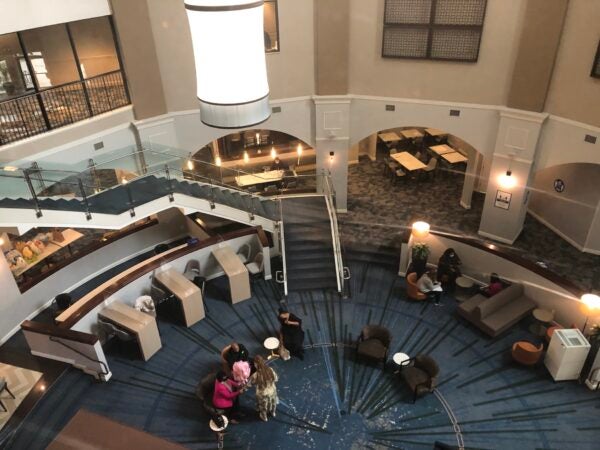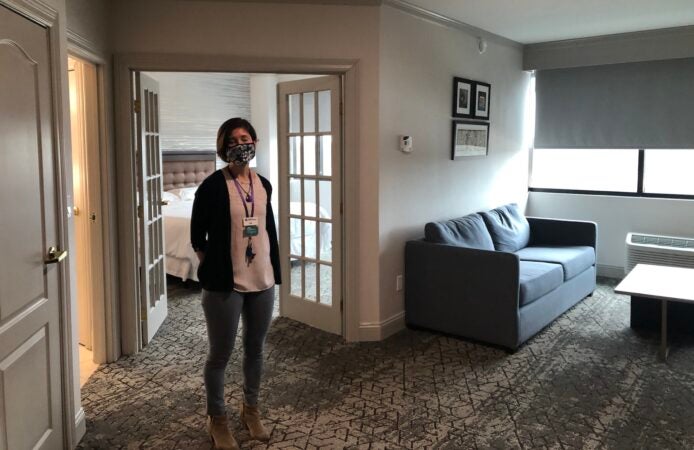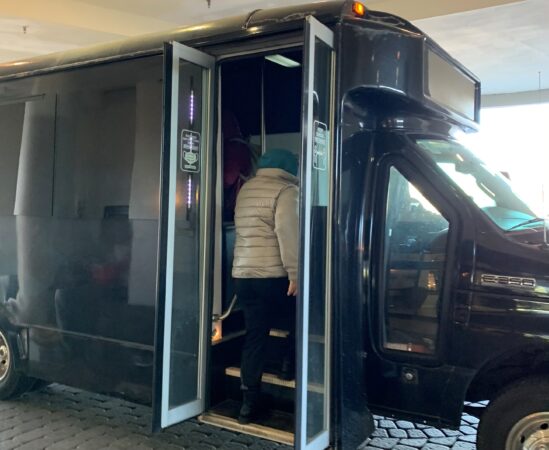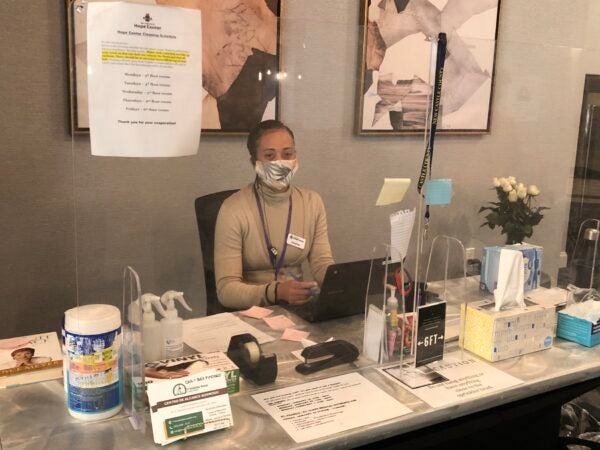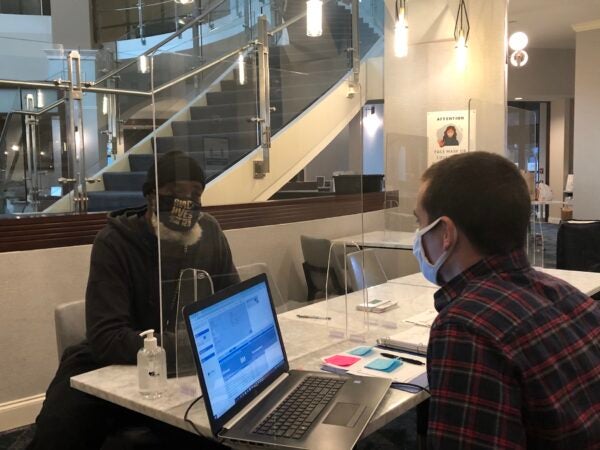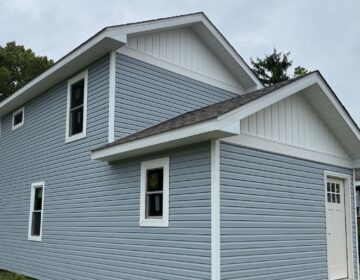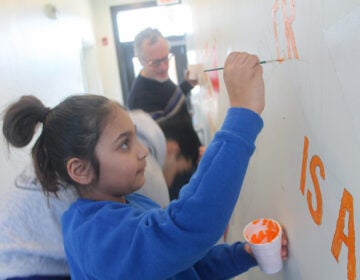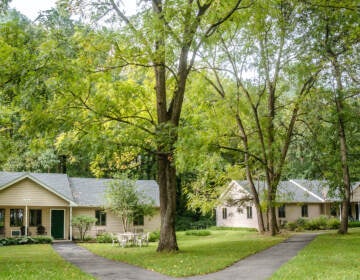Del. ‘Swamp Hotel’ now a swank ‘stepping stone’ for people experiencing homelessness
New Castle County bought the hotel to create a comprehensive shelter and service center to help guests transition to stable, permanent housing.
Listen 6:01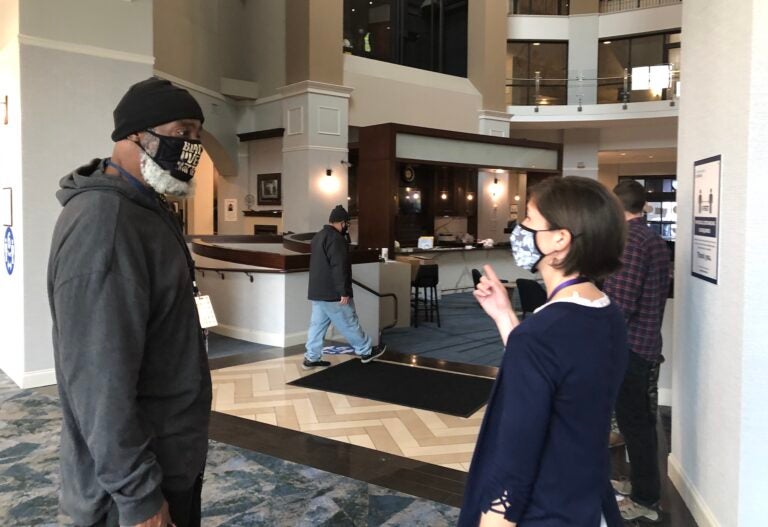
Hope Center executive director Kim Eppehimer talks to guest David Hicks in the lobby. (Cris Barrish/WHYY)
Cassie Brown raps hard on the door.
“Good afternoon,’’ she calls out. “Lunch.’’
A woman cracks it open and peers into the hallway.
“Hi, Miss Stephanie, Mr. Jamal. How are you guys doing today?’’ Brown inquires as she hands over a plain brown bag packed with a day’s worth of meals: cereal, soup, pork loin with rice and beans, and a chicken salad wrap.
The woman doesn’t poke her head out. She accepts the package, says she’s doing fine and thanks Brown for asking.
“You are welcome,’’ Brown says. “Have a great day. I’ll see you later.”
Brown makes a note on her tablet, grabs the handles of a metal cart and marches to the next door of what, until recently, was a swank Sheraton hotel.
This is what the room service is like at the New Castle County Hope Center, which has provided housing and transitional services for people without a place to live since mid-December.
The 192-room former hotel with a dramatic, six-story atrium off I-95, just south of Wilmington, currently has 136 residents, with more referred every day through the state’s housing assistance referral program.
The latest reincarnation of what was once derided as the “Swamp Hotel” represents a stunning, innovative, and unique transformation. The hotel earned its nickname because it was built two decades ago next to wetlands that overflow on the access road after heavy rains, making it impassable. The hotel had a series of owners and operators who tried in vain to make it a success.
The building went up for auction in the fall and the county stepped in, using its coronavirus relief CARES Act money to snap it up for $19.5 million on Dec. 1.
Two weeks later, as the winter loomed, the doors opened.
Brown, who is studying human services at Delaware Technical Community College, is delighted to be on the staff at the former hotel where she once stayed for a wedding.
“The guests wake up every day and are so thankful and say ‘thank you’ to us for helping them to rebuild their self-esteem,’’ Brown told WHYY News.
“Coming in and being able to get a shower or getting their food or having someone speak to them like they are a human being is ten times better than waking up on the corner and being treated like trash.”
A WHYY reporter spent several hours at the center this week to chronicle the evolving and ambitious experiment in a state where advocates have long complained about a shortage of affordable housing and a patchwork of small shelters that can’t accommodate the number of people without homes. Housing advocates estimate about 1,000 of New Castle County’s 560,000 residents do not have permanent shelter.
Interviews with staff, guests, and service providers revealed that the Hope Center is a work in progress as it yearns to empower people who have lived on the streets, makeshift campsites, or rundown motels while dipping in and out of shelters when beds are available.
Nice digs, social services, and a furry Sweet Potato
Along with being fed catered meals, the temporary residents are getting a typical hotel experience with fresh towels, linens, hygiene products, snacks and a weekly cleaning of their rooms provided by staffers of the former hotel who have been retained.
The rooms have spacious bathrooms. Some have whirlpool tubs and separate living areas. There are mini-refrigerators, microwaves, and packets of Starbucks coffee in each room, too.
Beyond the creature comforts, residents are offered a wide array of services, including assistance with getting an ID card or a voucher for subsidized housing, medical checkups and prescriptions, screenings and referrals to counseling, or something as simple as a new blanket.
An hourly shuttle takes them to a DART bus hub where they can get transportation to appointments, run errands, or visit friends and relatives.
The tenants include a handful of families, including one mother with seven children who leaves early in the morning to get the kids to school and to caretakers before going to work.
Two women are pregnant, and a third gave birth on Monday.
The hotel is also pet-friendly, and has become home to a service dog named Mr. Scruffs, two bearded dragons, and a blind guinea pig named Sweet Potato.

‘This is meant to be temporary’
The difficulty of the Hope Center’s mission has been compounded by the COVID-19 pandemic. To protect the guests as well as staff, clients who aren’t out working or running errands must maintain physical distance — even as they try to connect with the myriad of services offered in-house.
Many spend the vast majority of their days and nights in their rooms, perhaps further isolated, official Kim Eppehimer acknowledged, as they work with the staff to figure out how to move toward stable housing and independence and avoid contracting the coronavirus.
Eppehimer has for years been executive director of the nonprofit Friendship House that provides day services to people experiencing homelessness. Her organization is now running the Hope Center as a contractor.
“So it’s not just about now that you’re here, you are getting stable housing and food, which is critical,” Eppehimer said. “The next step is, now where do you go from here? The idea is this is meant to be temporary.”
Overcoming homelessness, which is often coupled with poor physical health, addiction, and mental illness, has been especially hard during the pandemic, she said.
“For some people, it could take a while. We understand that, so we’re not trying to kick them out the door by any stretch of the imagination. We want people to start thinking about what that can and should look like.”
She says the guests can stay through the winter if necessary. That has alleviated anxiety for many, she said, including one man in his 60s.
“We have one gentleman here who has been experiencing homelessness for many years,’’ she said. “He suffers from substance abuse disorder and he has said a few times, ‘If it wasn’t for this, I think this would have been the winter I died. I couldn’t have done it outside.’”
Along with getting their basic needs met, the tenants are afforded services they could never have imagined getting on the street, such as basic medical care.
Dr. Sandy Gibney spoke with a reporter during a break from examining patients in a converted conference room. She was joined by two nurses from the Newark Emergency Center, where she also works.
“We’re just assessing every client and getting them back on medications if they have chronic conditions,’’ Gibney said. “We’re also doing acute care issues, anything from pink eye to foot ulcers. And the chronic stuff — diabetes medicine, hypertension medicine, things like that.”

‘I never dreamed of being in this. This is amazing.’
Most of the 136 guests were either in their rooms or away from the Hope Center when a reporter visited. But a handful who ventured down to the spacious, ornate lobby told WHYY they were grateful for the chance to get settled and stay warm in semi-luxury as they worked toward getting their own housing.
David Hicks, 55, said he had been sleeping in his car for months after a relationship ended. He’d also stayed at the Sunday Breakfast Mission in Wilmington and spent days at drop-in centers. He’s battled addiction and has health problems, too, including chronic obstructive pulmonary disease.
“Unfortunately, this is not my first rodeo,’’ he said.
Hicks learned about the Hope Center last month when he overheard some women talking about the converted hotel as he ate breakfast at a McDonald’s restaurant.
“I inquired what they were talking about, where’s the place at?” Hicks told WHYY, saying he was astonished that it was the hotel once owned by Delaware Park casino, where his mom worked.
It took Hicks a few weeks to get approved. Now that he’s here, he said he’s been able to navigate some red tape to resolve financial barriers to getting his own place, hopefully soon.
“Now I will be able to provide for myself,’’ Hicks said. “I just needed a stepping stone. Thank God this was available.”
Hicks left to meet with case manager Tim Keeler, but first stopped to gaze around the towering atrium.
“This is a good deal man, for somebody striving to do something with themselves. I never dreamed of being in this, right here. This is beautiful,” he said.
‘Great starting point to get back on my feet’
Diana Bramlett and her 16-year-old daughter Adrienne Paoletti brought their two lizards, adult Zillah and baby Alpha, to the lobby, along with Sweet Potato, their peach-hued guinea pig.
The two have been without a permanent home since July, when they moved out of Bramlett’s mother’s house after a dispute. Bramlett, a restaurant manager who lost her job when the pandemic hit, stayed at hotels and motels for a while, and even camped out in the greater New Castle-area until the weather turned cold.
Bramlett said shelter life “is not normally this nice,’’ adding that she found herself without shelter about seven years ago when her heroin addiction was out of control. “Homeless shelters are very open and everyone is crowded together. This is a great starting point to get back on my feet.”
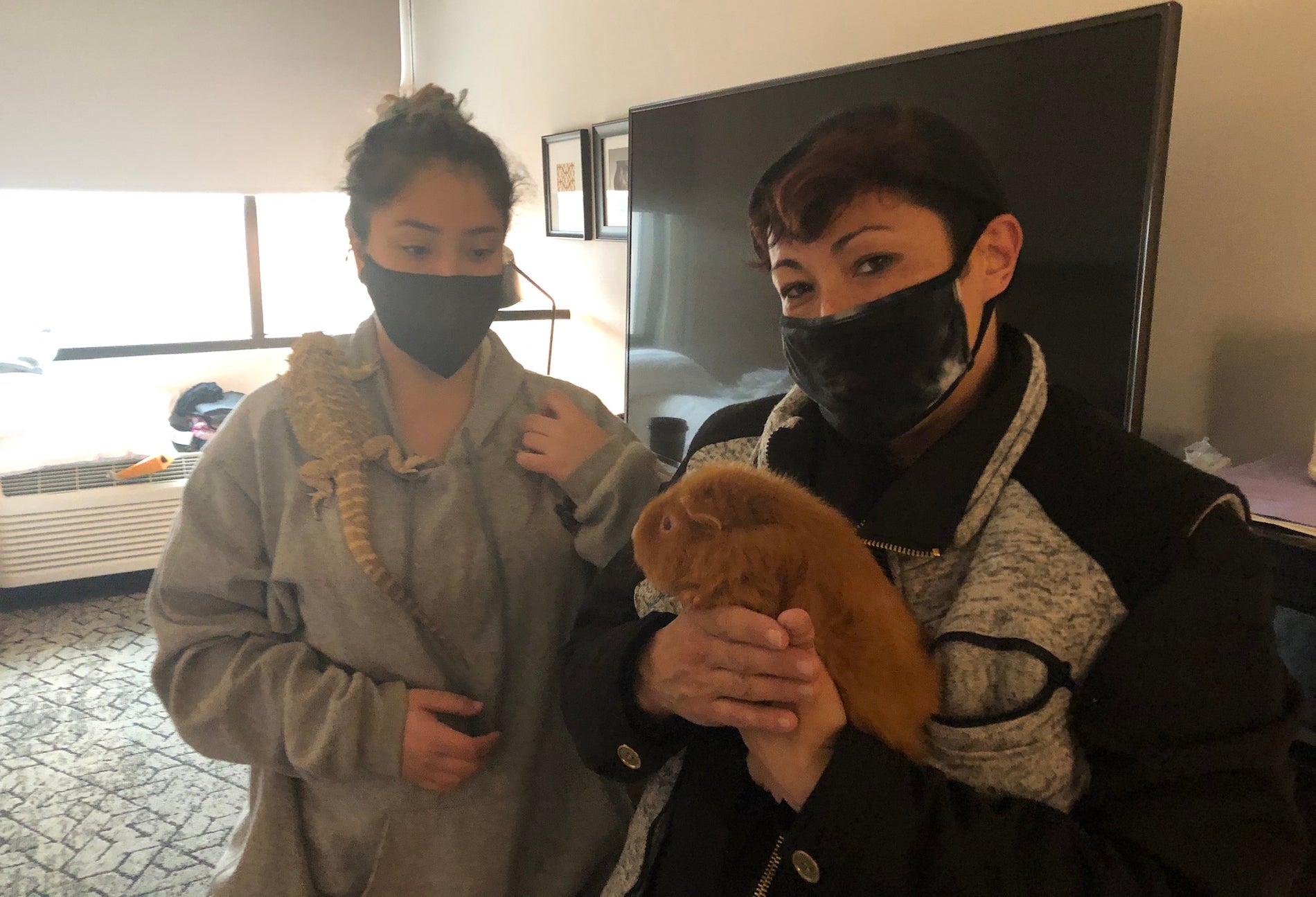
She heard about the Hope Center from traditional and social media. And when the winter weather came, they trekked to a state service center and an employee got them a room.
“It’s really got good intentions,’’ she said, adding that she’s grateful for the Hope Center while also offering suggestions to the staff to help make it easier for tenants to navigate the process.
“When I first got in, I didn’t know there were different resources,’’ she said. “They did explain it briefly, they go over it, but with your mind spinning from everything going on, I think in the first couple of days it would have been helpful if someone said, ‘Hey look, why don’t you come sign up for this.’”
She finally was able to meet up with Keeler, who is working to help her get into permanent housing as well as a Chromebook for her daughter so she can resume her junior year of high school.
A woman named Melissa spoke with WHYY while her one-year-old daughter Vivienne peeked out from behind a blanket while tucked into her stroller. Melissa, who said she suffers from anxiety that can lead to angry outbursts, did not want to give her last name to protect her privacy.
But she lauded the Hope Center and its work, saying she’s already making progress in finding housing and hopes to get a job in the educational system. She has doctor’s appointments pending.
“This is awesome,’’ Melissa said. “Every time I come down and need something it’s very fast. I understand they are very busy but they always have time for each client, so I like that a lot.”
This is her first shelter experience. “This is not what I expected,’’ she said. “I’ve heard a lot of horror stories about shelters, but this is a major step up. It’s a very lovely establishment. We’re in a better place so it puts me in a better head space, too.”
Comfort aside, ‘most people do want to have their own life’
Nicole Waters, a housing management analyst for the county who is now Hope Center’s operations director, said “wraparound services” are being added as quickly as possible.
Officials are in discussions with medical providers to expand health care services, and are seeking proposals for social services case management “to kind of quarterback everything’’ for each tenant, she said.
Waters pointed out that the center has only been in operation for just six weeks, and opened just two weeks after the county took possession of the facility.
“Everybody’s safe. We’re getting people tested [for COVID-19] regularly. People have a place to call home,’’ Waters said. “They’re staying warm. They are getting their health care needs met and needs of their pets met.”
Waters asked for patience as the kinks get worked out.
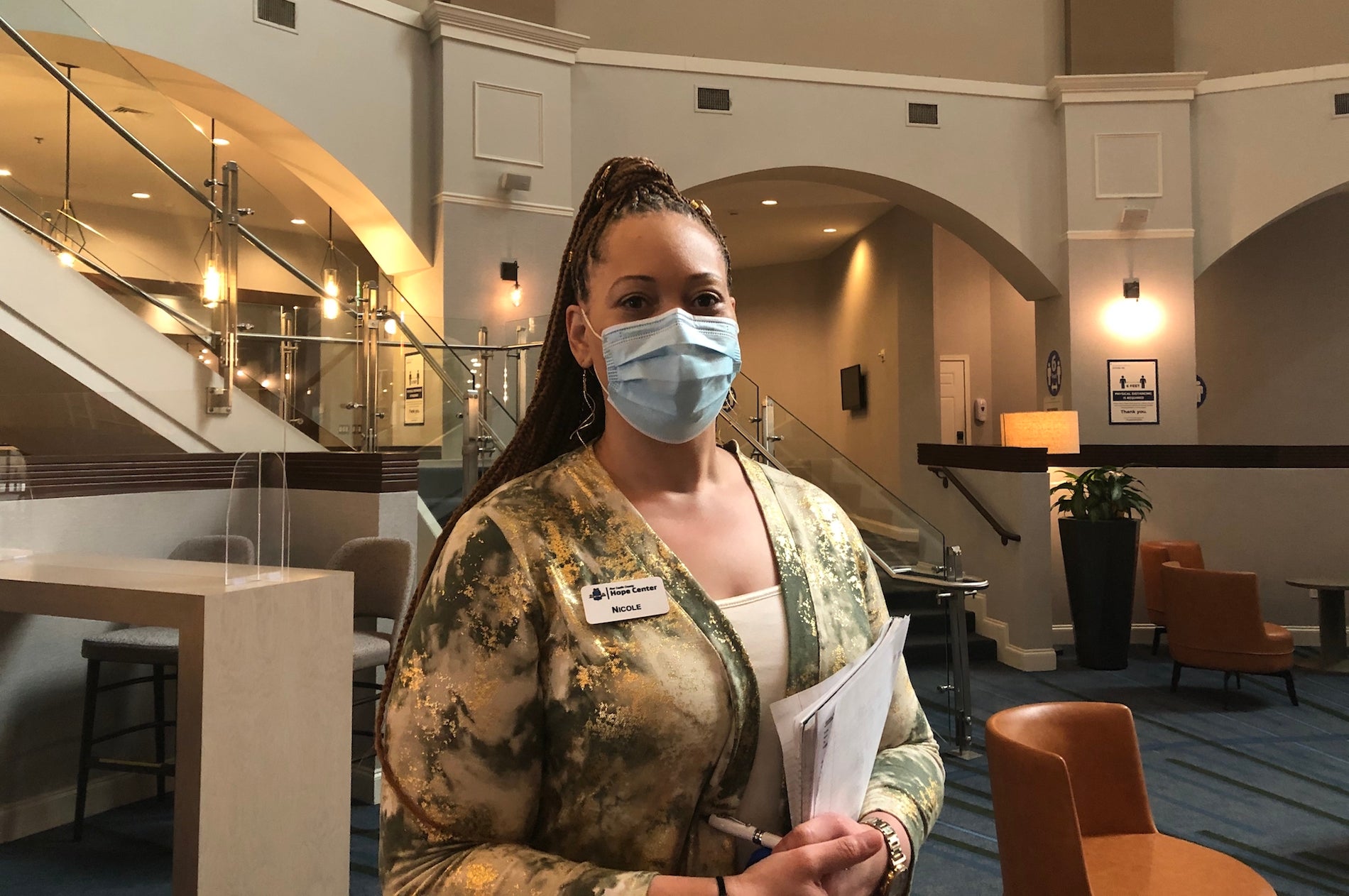
”It’s new for everyone, just having all of these different services under one roof, just kind of coordinating everything,” Waters said.
Growing pains aside, the undeniable fact is that even though the center is still figuring out the best way to operate, and some tenants might bristle at having to follow house rules, such as a ban on alcohol, Delaware has never had a shelter of such scope or grandeur.
Eppehimer chuckled when asked whether it will be difficult to get guests to leave once they find housing in less opulent digs.
“Yes, it’s true,’’ she said. “We do make jokes about that. But generally most people do want to have their own life. Yes, this is comfortable. Yes, they’re fed, but they just can’t do what they want when they want, how they want.
“They still have to abide by rules. And even though the rules are very friendly and this is meant to be a comfortable place, when they first get here we start talking about their transition.”
Keeler, who normally works at Friendship House, said building such a comprehensive service and transition system is “a learning experience for all of us.”
“Typically the shelter programs just kind of put a Band-Aid on them, give them a night to stay, which is important. The goal here is to help our guests attain long-term housing.”
Asked how he defined success, Keeler reflected for a moment. His answer spoke volumes about the complexity and difficulty of overcoming homelessness.

“A person at a time,’’ Keeler said. “Everybody starts in a different place. Success for one person is going to look different than it will for another.
“They might have an addiction issue and they need to get clean. Success for another person may be not getting kicked out of here. Maintaining housing for longer than a couple weeks.
“For somebody else, it might be reaching out for assistance with a mental health issue. For somebody else it might be achieving long-term housing. Another person it might be getting a job, holding a job for 90 days.”
Yet neither Keeler nor Eppehimer have a Pollyannaish view of the challenge facing the center and its clients.
“Some may end up going back out to their campsites,’’ she said. “It just sort of depends on who’s there, where they are on their journey, and what they are interested in pursuing.”
WHYY is your source for fact-based, in-depth journalism and information. As a nonprofit organization, we rely on financial support from readers like you. Please give today.



